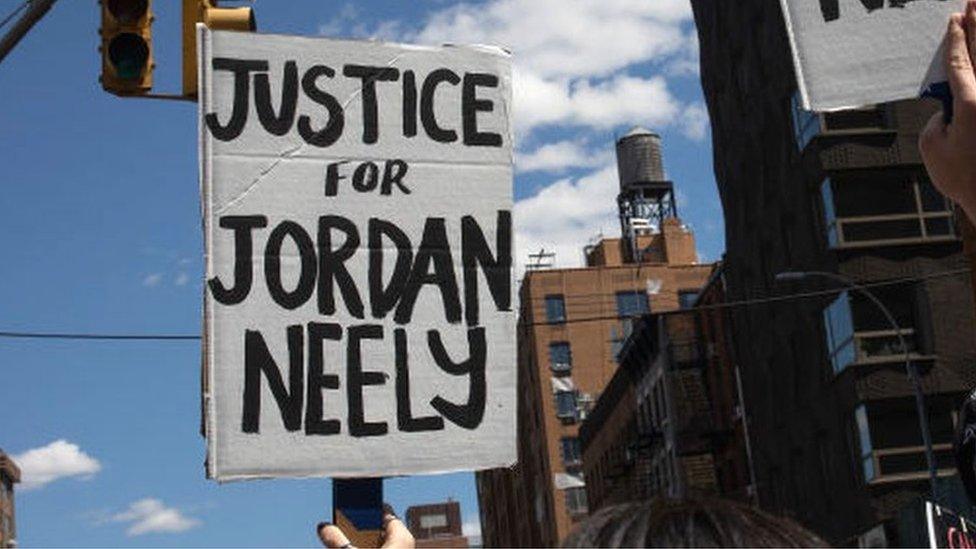Jordan Neely: Subway chokehold victim laid to rest in New York
- Published
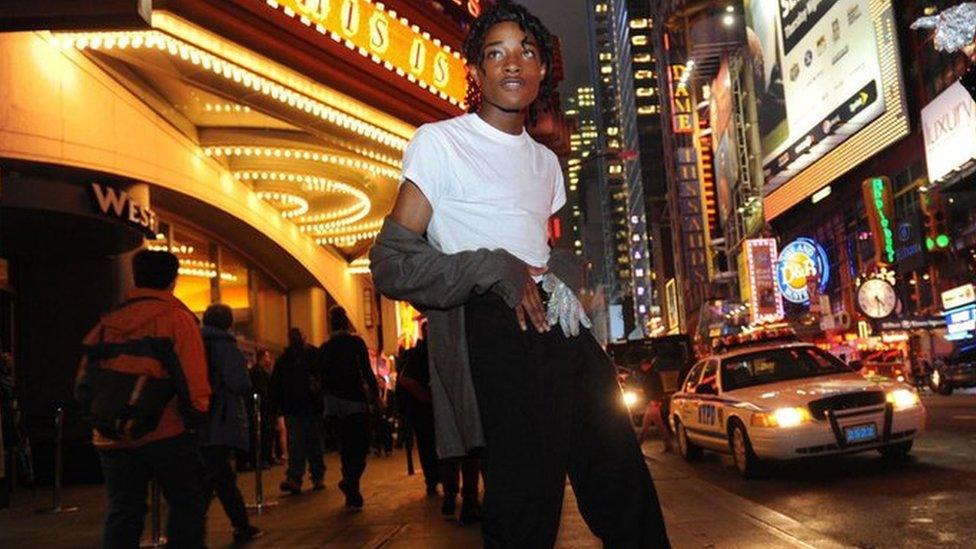
Hundreds of mourners in New York City gathered for the funeral of Jordan Neely, a homeless man and former subway performer whose death has sparked a national debate about homelessness, race, and public safety.
During a service that lasted nearly two hours, speakers expressed hope that the 30-year-old's death would prompt reforms to the city's complex and flawed system for helping the homeless.
But they also demanded accountability for his death, which many at the funeral saw as yet another unjust killing of an African American man.
"We should not not celebrate Jordan's life," said Reverend Al Sharpton during his eulogy. "But we should not ignore how he died."
Mourners demand justice
It was the circumstances of his death that had brought so many people to Harlem's Mount Neboh Baptist Church on Friday morning.
Mr Neely died in an altercation on subway car on 1 May after another passenger, 24-year-old Daniel Penny, placed him in a chokehold for several minutes.
Witnesses on the train said Mr Neely had entered the car shouting that he was hungry, thirsty, and ready to die. No evidence has yet emerged that Mr Neely physically attacked anyone during the incident.
A local journalist captured the incident on video, which showed Mr Penny with his arm around Mr Neely's neck as he slowly lost consciousness and grew still.
Mr Penny, a former US Marine, was charged with manslaughter over Mr Neely's death. Lawyers for Mr Penny have said that acted in self defence, "never intended" to harm Mr Neely and "could not have foreseen his untimely death".
They added that Mr Penny and fellow passengers "acted to protect themselves, until help arrived".
On Friday, Mr Neely laid in a closed, white and gold casket before the altar at Mount Neboh. A large wreath of red and white flowers rested on top.
It was the same church that had held the funeral for his mother, who was murdered in 2007, external. Mr Neely sat in the same pews his own mourners now occupied, said Reverend Dr. Johnnie Green, who led the service.
Now those seats held leaders from New York City's religious, political, and activist communities, including Congresswoman Alexandria Ocasio-Cortez and New York Lieutenant Governor Antonio Delgado.
But the rest were filled with regular New Yorkers who gathered to pay their respects.
"We came here to celebrate how he lived, not how he died," Dr Green said.
Reading his obituary, his aunt, Mildred Mahazu, told the congregation Mr Neely had been a talented Michael Jackson impersonator.
"He performed in front of thousands of people in the streets of New York City and on the subways where he was well known and loved," she said.
Echoes of other deaths
But Mr Neely also faced problems during his short life.
After his mother's death, Mr Neely had experienced homeless and significant mental health struggles.
The New York Times reported that homeless advocates had attempted at several points to help Mr Neely, but that he ultimately fell through the city's tangled safety net for homeless people.
Mr Neely had 42 previous arrests on charges such as evading fares, theft and assaults on three women, according to US media.
His death placed a spotlight on the thousands of people who, like Mr Neely, live without reliable housing in New York City and often struggle to access the necessary mental health services.
But the incident has also divided people in New York and across the US, with some criticising Mr Penny's actions and calling for justice for Mr Neely.
Mr Neely's death has reignited a decades-long conversation about racial justice in the United States. Video of Mr Neely's death ricocheted around the city and prompted several days of protests.
Many see echoes of the deaths of Eric Garner, a black man who died in 2014 after a police officer placed him in a chokehold, or George Floyd, who died in 2020 after a police officer pressed his knee into his neck during an arrest.
Both deaths sparked nationwide protests against racism and inequality in the justice system.
At the same time, conservative figures have defended Mr Penny, and a fundraiser for his legal defence has accrued over $2m (£1.61m).
Florida Governor Ron DeSantis, a Republican and likely presidential candidate, has called Mr Penny a "Good Samaritan".
Mr Sharpton addressed this directly in his eulogy. He saved his sharpest words for Mr DeSantis, and others who referred to Mr Penny as a Good Samaritan.
He relayed the Biblical tale, where two individuals pass by a man who has been beaten and robbed, before a third, a Samaritan, stopped to help.
"A Good Samaritan helps those in trouble," he said. "They don't choke them out."
He criticised police officers who had initially released Mr Penny after the incident, and argued race had played a role in authorities' response.
Homeless support
During the service, churchgoers stood and chanted "no justice, no peace!", a common rallying cry at Black Lives Matter protests.
Several speakers also called for Mr Neely's death to trigger reforms to New York City's approach to caring for the homeless.
At the moment, the city relies on a patchwork system of agencies, outreach organisations, and shelters, which homelessness advocates say does not go far enough to truly alleviate the issue.
Mr Sharpton condemned what he said was New York City's failure to care for the homeless.
"He's been choked his whole life," Mr Sharpton said, adding that "in your name, we're going to change how they deal with the homeless".
Across the street, peaceful demonstrators had unveiled a banner. It read: "Jordan Neely… enough is enough."
With additional reporting by Bernd Debusmann
Related topics
- Published6 May 2023
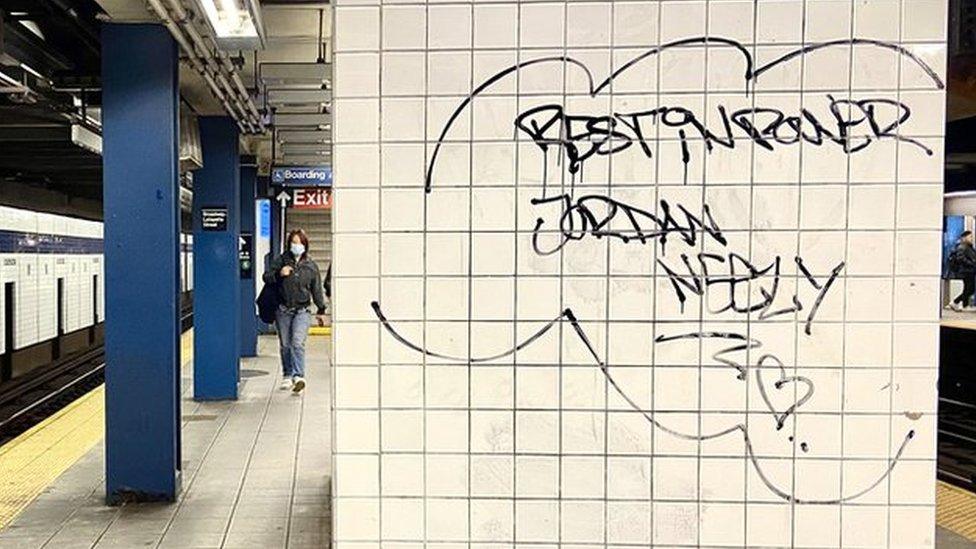
- Published13 May 2023
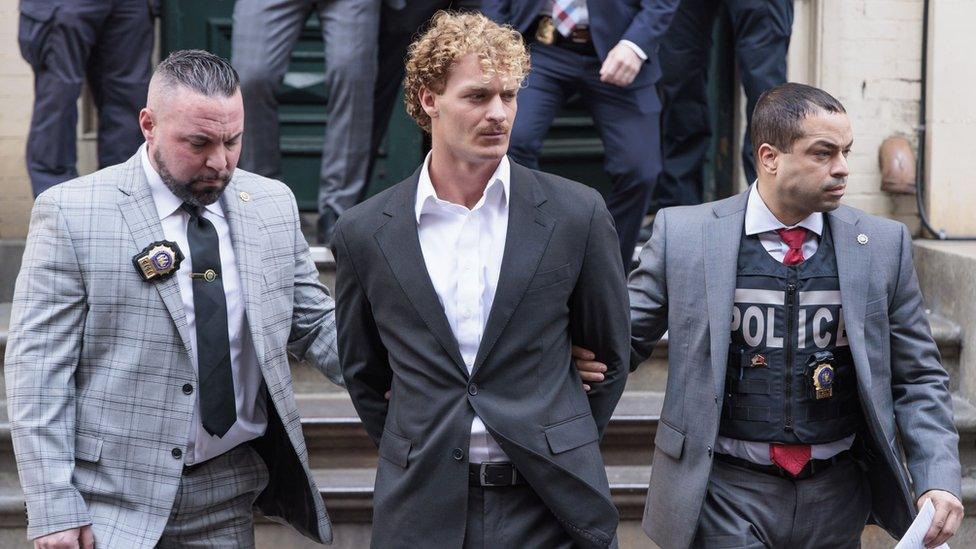
- Published28 June 2023
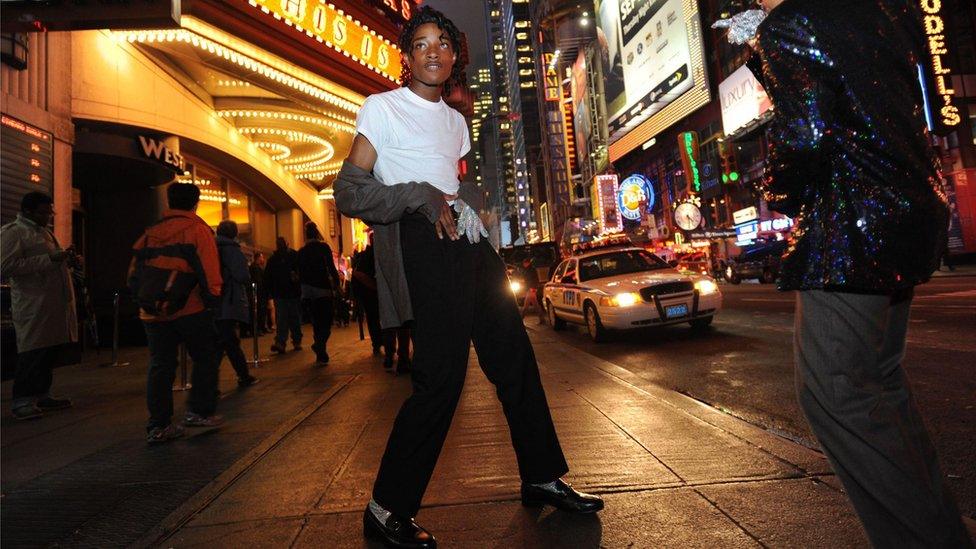
- Published12 May 2023
